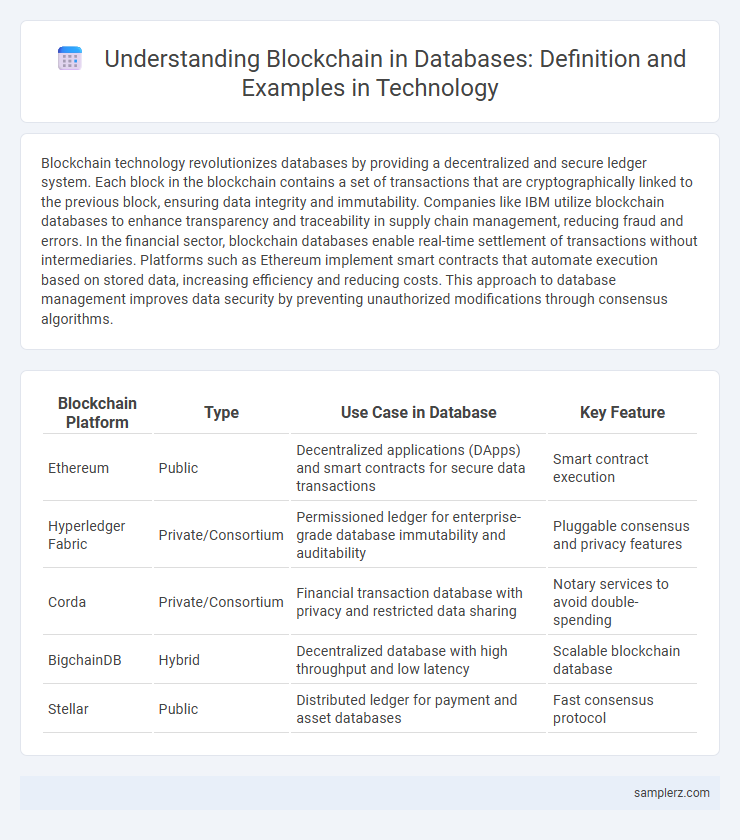Blockchain technology revolutionizes databases by providing a decentralized and secure ledger system. Each block in the blockchain contains a set of transactions that are cryptographically linked to the previous block, ensuring data integrity and immutability. Companies like IBM utilize blockchain databases to enhance transparency and traceability in supply chain management, reducing fraud and errors. In the financial sector, blockchain databases enable real-time settlement of transactions without intermediaries. Platforms such as Ethereum implement smart contracts that automate execution based on stored data, increasing efficiency and reducing costs. This approach to database management improves data security by preventing unauthorized modifications through consensus algorithms.
Table of Comparison
| Blockchain Platform | Type | Use Case in Database | Key Feature |
|---|---|---|---|
| Ethereum | Public | Decentralized applications (DApps) and smart contracts for secure data transactions | Smart contract execution |
| Hyperledger Fabric | Private/Consortium | Permissioned ledger for enterprise-grade database immutability and auditability | Pluggable consensus and privacy features |
| Corda | Private/Consortium | Financial transaction database with privacy and restricted data sharing | Notary services to avoid double-spending |
| BigchainDB | Hybrid | Decentralized database with high throughput and low latency | Scalable blockchain database |
| Stellar | Public | Distributed ledger for payment and asset databases | Fast consensus protocol |
Transforming Data Integrity: Blockchain in Database Systems
Blockchain technology revolutionizes data integrity in database systems by providing decentralized, tamper-proof ledgers that ensure immutability and transparency. Each transaction is cryptographically secured and time-stamped, preventing unauthorized alterations and enabling real-time auditability. Integration of blockchain enhances trust in data management, making it ideal for industries requiring rigorous compliance and security such as finance, healthcare, and supply chain management.
Decentralized Data Management: Key Blockchain Use Cases
Blockchain technology revolutionizes decentralized data management by enabling secure, tamper-proof distributed ledgers used in supply chain traceability and financial record-keeping. Platforms like Ethereum leverage smart contracts to automate transactions and enforce data integrity without central authority. This decentralized approach enhances transparency, reduces fraud, and ensures consistent data updates across all network participants.
Enhancing Database Security with Blockchain Integration
Blockchain integration enhances database security by creating an immutable ledger that prevents unauthorized data alteration and ensures transparency through cryptographic hashing. Distributed consensus mechanisms eliminate single points of failure, reducing the risk of cyberattacks and data breaches in centralized databases. Examples include supply chain management systems and financial transaction records where blockchain maintains data integrity and auditability.
Real-World Examples: Blockchain-Enabled Databases
Blockchain-enabled databases enhance data integrity and security in supply chain management by providing transparent and tamper-proof records, as demonstrated by IBM Food Trust's use of Hyperledger Fabric to track food provenance. In finance, JPMorgan Chase's Quorum platform leverages blockchain to streamline transaction processing and improve auditability across interconnected banking networks. Healthcare systems like MedRec utilize blockchain databases to manage patient records securely while enabling controlled data sharing among providers.
Blockchain for Transparent and Immutable Data Storage
Blockchain technology revolutionizes database management by providing transparent and immutable data storage, ensuring data integrity through cryptographic hashing and decentralized consensus mechanisms. Use cases in supply chain management track provenance with an unalterable ledger, boosting trust and accountability among stakeholders. Financial services implement blockchain to record transactions transparently, eliminating fraud and reducing discrepancies in audit trails.
Smart Contracts for Automated Database Processes
Smart contracts enable automated database processes by executing predefined rules without intermediaries, enhancing transaction speed and security. These blockchain-based protocols facilitate data validation, access control, and audit trails, ensuring integrity and transparency in database management. Industries such as finance and supply chain leverage smart contracts to streamline operations and reduce manual intervention.
Blockchain Solutions for Enterprise Data Management
Blockchain solutions for enterprise data management enhance data integrity and transparency by creating immutable, decentralized ledgers that prevent unauthorized alterations. Enterprises utilize platforms like Hyperledger Fabric and Corda to securely track transactions and streamline audit processes across supply chains and financial services. These blockchain databases enable real-time data sharing while maintaining privacy through permissioned access controls, improving operational efficiency and compliance.
Hybrid Database Architectures Leveraging Blockchain
Hybrid database architectures leveraging blockchain combine traditional relational databases with decentralized ledger technology to enhance data integrity and security. These systems use blockchain to create immutable transaction records while maintaining high-speed query performance through conventional databases. Examples include supply chain management platforms where blockchain ensures transparent audit trails, and financial services applications integrating blockchain for fraud prevention and real-time data synchronization.
Tackling Data Privacy with Blockchain Technology
Blockchain technology enhances database security by enabling decentralized data storage, which reduces the risk of unauthorized data breaches and tampering. Cryptographic algorithms, such as SHA-256 and elliptic curve cryptography, ensure data integrity and confidentiality within distributed ledger systems. Industries like healthcare and finance implement blockchain to maintain transparent audit trails while protecting sensitive personal information through permissioned access controls and zero-knowledge proofs.
Blockchain vs Traditional Databases: Comparative Analysis
Blockchain technology offers decentralized, immutable ledgers that enhance security and transparency compared to traditional centralized databases, which are vulnerable to single points of failure and unauthorized data modification. Traditional databases excel in transaction speed and efficiency due to optimized indexing and query processing, while blockchains prioritize consensus mechanisms like Proof of Work or Proof of Stake to ensure data integrity across distributed nodes. Industries such as finance, supply chain, and healthcare leverage blockchain for tamper-proof record-keeping and auditability, contrasting with conventional databases primarily suited for complex relational queries and high-throughput applications.

example of blockchain in database Infographic
 samplerz.com
samplerz.com